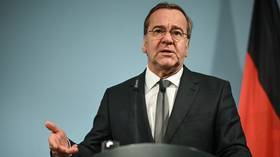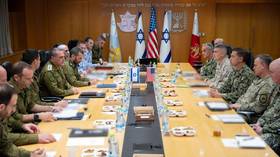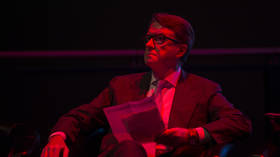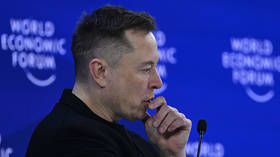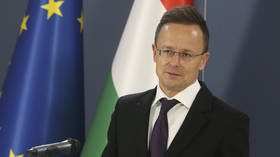Big BRICS for smaller nations: How unconditional can the NDB conditions be?
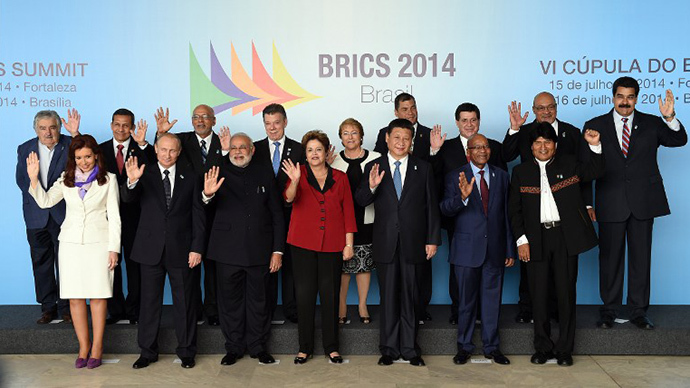
Jim O’Neill would have never imagined his intellectual exercise will turn into flesh and blood one day –the “accidentally” huddled initials of geographically disparate nations will become so real to make the New Development Bank (NDB).
For the Global South, the NDB - seeded with $50 billion from $10 billion contribution of each of the five signatories against the authorized initial capital of US$ 100 billion – is an assertion of being able to stand independent without handholding by the Western-backed IMF or World Bank.
And for smaller developing countries beyond BRICS it means emancipation from the harsher conditions of the World Bank and IMF aid who usually tag privatization and liberalization as an obligation to their loans.
An Oxfam paper cites the case of the Republic of Mali where the World Bank and the IMF had made their budget aid conditional on the privatization of Malian electricity and its cotton sector leading to hiked electricity prices and adversely affecting cotton farmers. A Norwegian government study of the IMF in 2006 had found 26 out of 40 poor countries had privatization and liberalization conditioned to their IMF loans.
So certainly an NDB is a hope of an alternative which may treat them with more empathy as they eagerly look forward to the possible accessing of the $100 billion Contingency Reserve Arrangement (CRA).
The NDB will finance infrastructure and sustainable development projects – a huge need especially as more countries try to graduate from low-income status.
Luciano Coutinho, Brazilian economist and President of the Brazilian Development Bank, talking to Al Jazeera estimated an immediate need for $600bn to $700bn in new investment in infrastructure in developing countries.
Countries like Bangladesh need at least $5 billion a year for the next 10 to 15 years to build necessary infrastructure. According to UNCTAD investment inflows are dismal in the country mainly because of infrastructure gaps. For Nepal, electricity and transport are the two major developmental needs.
Credit worthiness
For the NDB to build its initial credibility, it will have to maintain high standards of lending and ensure minimal defaulters. The two most important questions are how to create strong and efficient domestic financial structures that could work in tandem with the regional institution and extend high quality loans to improve its credit rating. And if it has to earn profits on the loans – which it should for future expansion – NDB will also have to charge an interest rate.
While smaller developing countries could borrow from the NDB without facing austere conditions, presenting a viable domestic environment for investment – most of which are plagued by inefficient governance and the poor ability of repayment even with a concessional interest rate – will be a challenge.
Additionally a professional assessment of each project on its soundness and possibility of success will be extremely crucial and even stringent if NDB is serious about its effectiveness. How well will a low income country do on the radar of feasibility of its project is another question.
As Vikram Nehru, Senior Associate, Asia Program, Bakrie Chair in Southeast Asian Studies, Carnegie Asia Program says, “The New Development Bank will have to borrow from capital markets to leverage its equity and will therefore need to charge an interest rate that will be close to the IBRD interest rate. This means that the NDB's clients are most likely to be creditworthy developing countries. In the initial period, it is very likely that the NDB will lend only to the BRICS themselves, but gradually more developing country members could be added as potential borrowers. The upshot is that low income developing countries are very unlikely to gain access to NDB resources, at least not for the foreseeable future and under its current proposed design.”
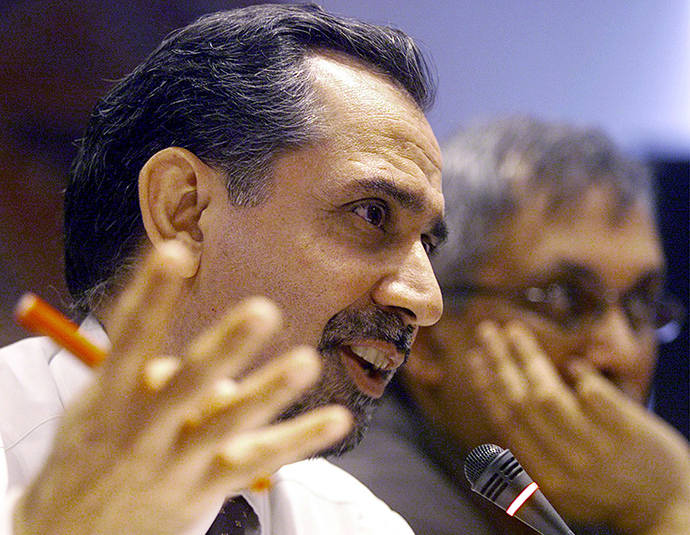
Though reports indicate a hefty pool of investment capital from developed countries looking for profitable returns, they require efficient government and high standard projects to come forward.
On the other hand while “less conditions” is the key reason for the keenness on NDB, it might also work against it sometimes. Smaller countries may find conditioned IMF or a World Bank projects a better option to build credibility with investors especially from the West as it proves their commitment. So in the predictable future they might continue to seek Bretton Woods institution aid.
James Raymond Vreeland, Associate Professor of International Relations in the School of Foreign Service, Georgetown University & author of ‘The IMF and Economic Development’ Points out: “The BRICS have a different view of the proper role of the state in the economy – a view that differs from the Washington consensus of small government. So the NDB potentially may represent a different path for developing countries.
But often developing countries turn to the IMF and the World Bank to send a credible signal to foreign investors and creditors of their commitment to market forces. As the NDB will lack conditionality, their loans may not send the same kind of signal of commitment. So, some developing countries may still prefer to work with the Bretton Woods institutions.”
A hegemony swap?
China’s possible domination is a petrifying anticipation of these countries. After all it was China – bigger than all the other BRICS nations – who contributed the maximum with $41 billion to the CRA with its counterparts Brazil, Russia and India at $18 billion each and South Africa $5 billion.
Though BRICS will have minimum of 55 percent lenders’ stake many fear China may increase its hold by bringing in new member countries from its sphere of influence. And if it does what would happen to countries outside its sphere of influence?
As Nehru puts it, “The proposed design of the NDB, which has each BRICS member contributing the same amount of equity, is precisely to ensure that no single country obtains the upper hand or dominates the institution. But the reality is that China is by far the largest economy among the BRICS and will inevitably have considerable influence.”
There are also questions around how existing relations will play up at the background of this new development. How would the Community of Latin American & Caribbean States (CELAC) - with whom China already shares a huge trade relationship – be positioned, and how to balance this with traditional relationships?
Opinions pieces from the Caricom (Caribbean Community) region are asking if members, specifically ‘If China be prepared to make the compromises necessary for an effective multilateral approach, and whether the BRICS will be able to bury their political and military differences.’
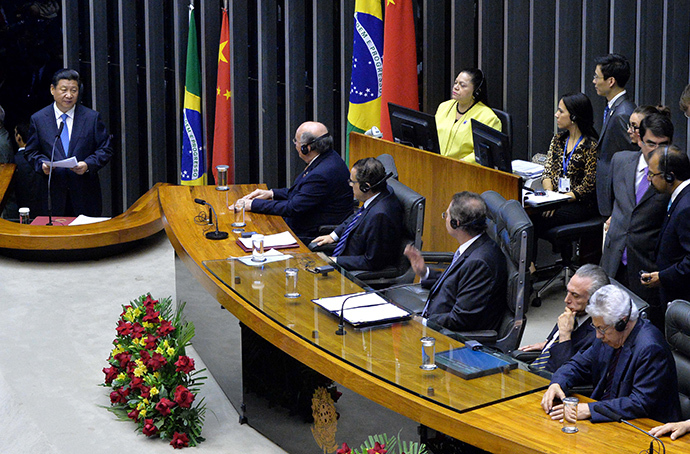
Vreeland speculating a probable situation of Chinese domination feels it is a paradoxical state with each having equal voting power over the NDB, the institution lacks a leader. So it is unclear how they will resolve differences in opinions as they develop down the road.
“With strong leadership, however, comes the potential for the leader to use its influence over the NDB to promote a strategic agenda. Consider the lending patterns at the Bretton Woods institutions. While much of their lending is driven by objective economic indicators, research has also shown that countries that are economically or strategically important to the largest shareholders (mainly the United States) receive better treatment than other countries. In my research with Axel Dreher (Heidelberg University) and Jan-Egbert Sturm (ETH), we have shown that countries serving on the UN Security Council, countries that are strategically important to the United States for their votes, receive more loans from the World Bank and the IMF, and lighter IMF conditionality.
One can therefore imagine that were China to take a stronger leadership role at the NDB, the institution might provide more favorable loans to countries that follow policies in line with China's preferences on all sorts of issues like Taiwan and the South China Sea. “
But many say NDB is a different ballgame altogether. Here China – with a foreign currency reserve of up to $4 trillion, needs to showcase itself as a team player to ensure smooth running of the bank through which it will also get access to new investment opportunities.
Dr Victoria V. Panova, Associate Professor, Department of International Relations and Foreign Policy of Russia MGIMO-University, MFA Russia agrees: ”Yes, China is most powerful of the five but recent negotiations showed they are eager for compromise. They managed to push for Shanghai as the HQ, but on the other hand India acquired for the first 6 years the chair, South Africa managed to secure a regional office, and concerns of the other four but China on one country - one voice were taken into account, which is probably most important of all.”
However Panova adds that while for all practical reasons there will be an equal play within the group, as the BRICS become too assertive and too real there could be external forces trying to create a dent. “American strategy of surrounding China and exploiting South China and East China Seas or dragging Russia into conflict around Ukraine is parts of this policy to weaken the stands of the BRICS countries in all areas - be it political, economic, and financial. Those five together became too assertive and too real. What BRICS should do - they basically have to stand by each other and not allow outsiders to split their ranks.”
So while China for now may choose to play a collaborative role in NDB, the BRICS leaders will most likely prefer a balanced assortment of loans comprising both middle and low income countries. However, during the initial phase when the NDB endeavors to find its feet, it’s the borrowers with better repayment capability and sound governance – presumably middle income countries – who will reap the benefits of the NDB resources.
The statements, views and opinions expressed in this column are solely those of the author and do not necessarily represent those of RT.
The statements, views and opinions expressed in this column are solely those of the author and do not necessarily represent those of RT.




